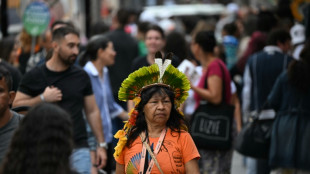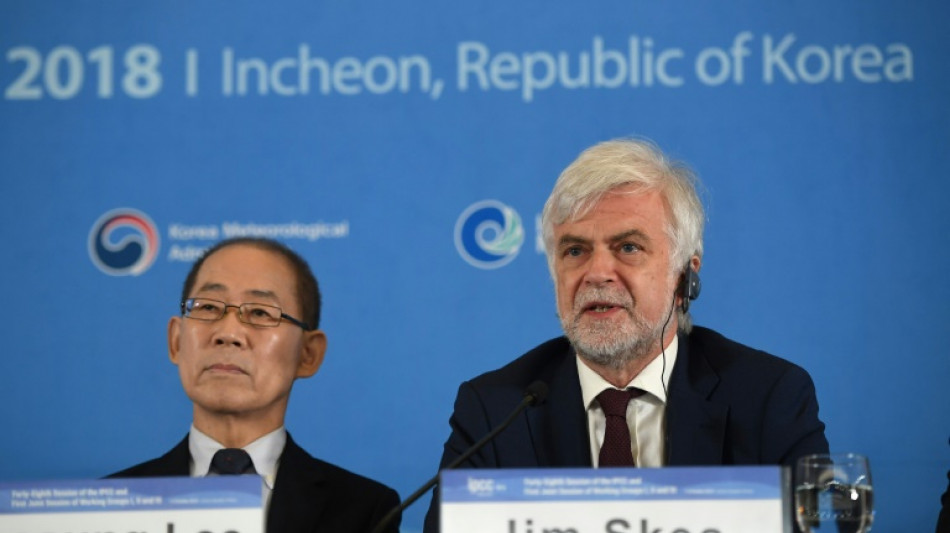
-
 Taylor holds off bloodied Serrano to retain undisputed crown
Taylor holds off bloodied Serrano to retain undisputed crown
-
Japan PM expresses concern to Xi over South China Sea situation

-
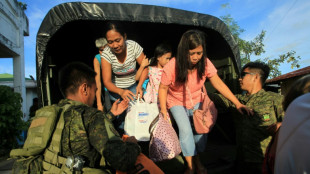 Tens of thousands flee as Super Typhoon Man-yi nears Philippines
Tens of thousands flee as Super Typhoon Man-yi nears Philippines
-
Hoilett gives Canada win in Suriname as Mexico lose to Honduras

-
 Davis, James spark Lakers over Spurs while Cavs stay perfect
Davis, James spark Lakers over Spurs while Cavs stay perfect
-
Mushroom houses for Gaza? Arab designers offer home-grown innovations

-
 Gabon votes on new constitution hailed by junta as 'turning point'
Gabon votes on new constitution hailed by junta as 'turning point'
-
Young Libyans gear up for their first ever election

-
 Vice tightens around remaining civilians in eastern Ukraine
Vice tightens around remaining civilians in eastern Ukraine
-
Dutch coalition survives political turmoil after minister's resignation

-
 Uruguay end winless run with dramatic late win over Colombia
Uruguay end winless run with dramatic late win over Colombia
-
Max potential: 10 years since a teenage Verstappen wowed in Macau

-
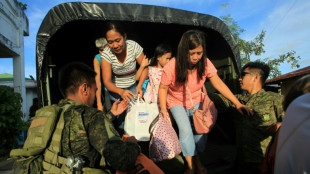 Tens of thousands flee as Typhoon Man-yi nears Philippines
Tens of thousands flee as Typhoon Man-yi nears Philippines
-
Is Argentina's Milei on brink of leaving Paris climate accord?
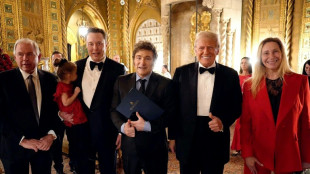
-
 Big Bang: Trump and Musk could redefine US space strategy
Big Bang: Trump and Musk could redefine US space strategy
-
Revolution over but more protests than ever in Bangladesh

-
 Minister resigns but Dutch coalition remains in place
Minister resigns but Dutch coalition remains in place
-
Ireland won 'ugly', says relieved Farrell

-
 Stirring 'haka' dance disrupts New Zealand's parliament
Stirring 'haka' dance disrupts New Zealand's parliament
-
England's Hull grabs lead over No.1 Korda at LPGA Annika

-
 Kosovo players walk off in Romania after 'Serbia' chants, game abandoned
Kosovo players walk off in Romania after 'Serbia' chants, game abandoned
-
Kosovo players walk off in Romania game after 'Serbia' chants

-
 Lame-duck Biden tries to reassure allies as Trump looms
Lame-duck Biden tries to reassure allies as Trump looms
-
Nervy Irish edge Argentina in Test nailbiter

-
 Ronaldo at double as Portugal reach Nations League quarters, Spain win
Ronaldo at double as Portugal reach Nations League quarters, Spain win
-
Fitch upgrades Argentina debt rating amid economic pain

-
 Trump picks Doug Burgum as energy czar in new administration
Trump picks Doug Burgum as energy czar in new administration
-
Phone documentary details struggles of Afghan women under Taliban

-
 Ronaldo shines as Portugal rout Poland to reach Nations League last-eight
Ronaldo shines as Portugal rout Poland to reach Nations League last-eight
-
Spain beat Denmark to seal Nations League group win

-
 Former AFCON champions Ghana bow out as minnows Comoros qualify
Former AFCON champions Ghana bow out as minnows Comoros qualify
-
Poland, Britain reach BJK Cup quarter-finals

-
 At summit under Trump shadow, Xi and Biden signal turbulence ahead
At summit under Trump shadow, Xi and Biden signal turbulence ahead
-
Lebanon said studying US truce plan for Israel-Hezbollah war

-
 Xi warns against 'protectionism' at APEC summit under Trump cloud
Xi warns against 'protectionism' at APEC summit under Trump cloud
-
Nigerian UN nurse escapes jihadist kidnappers after six years

-
 India in record six-hitting spree to rout South Africa
India in record six-hitting spree to rout South Africa
-
George tells England to prepare for rugby 'war' against Springboks

-
 Pogba's Juve contract terminated despite doping ban reduction
Pogba's Juve contract terminated despite doping ban reduction
-
Ukraine slams Scholz after first call with Putin in two years

-
 Michael Johnson's Grand Slam Track series to have LA final
Michael Johnson's Grand Slam Track series to have LA final
-
Kagiyama, Yoshida put Japan on top at Finland Grand Prix

-
 Alcaraz eyeing triumphant Davis Cup farewell for Nadal after ATP Finals exit
Alcaraz eyeing triumphant Davis Cup farewell for Nadal after ATP Finals exit
-
Xi, Biden at Asia-Pacific summit under Trump trade war cloud

-
 India go on record six-hitting spree against South Africa
India go on record six-hitting spree against South Africa
-
France skipper Dupont says All Blacks 'back to their best'

-
 Trump pressures US Senate with divisive cabinet picks
Trump pressures US Senate with divisive cabinet picks
-
Bagnaia strikes late in Barcelona practice to edge title rival Martin

-
 High-ball hero Steward ready to 'front up' against South Africa
High-ball hero Steward ready to 'front up' against South Africa
-
Leader of Spain flood region admits 'mistakes'


British professor elected to lead UN climate panel in key decade
British professor Jim Skea was elected to lead the UN's climate expert panel Wednesday, taking the helm of the organisation charged with distilling the best science to inform global policy in a critical decade for humans and the planet.
Skea, a Professor of Sustainable Energy at Imperial College London who co-chaired the report on curbing planet-heating emissions in the latest round of assessments, was elected chair at a meeting of the 195-nation organisation in Nairobi.
"Climate change is an existential threat to our planet," he told delegates.
With impacts already sweeping the planet -- from devastating floods to blistering heatwaves -- the Intergovernmental Panel on Climate Change (IPCC) plays a key role in the growing scientific knowledge on climate change.
Skea, 69, takes on the role as the world is already a third of the way through a crucial decade for climate action, which will set the course of warming and impacts that will ripple out for decades or even centuries.
He will oversee hundreds of experts -- who work on a voluntary basis -- and be charged with ensuring the smooth functioning of the institution.
Last year, the IPCC's key final report -- synthesising a host of major assessments since 2018 -- was postponed for "operational reasons", meaning it was not ready before crucial UN climate negotiations in November.
That document, dubbed a "survival guide" for the world, was finally released in March this year.
It said the world will cross the key Paris Agreement goal of 1.5 degrees Celsius warming since pre-industrial times in the early 2030s and urged dramatic reductions in planet-heating emissions.
- 'Forceful advocates' -
Skea, who has nearly forty years of climate science experience, outlined the main priorities for his tenure as improving inclusiveness and diversity, protecting the IPCC's integrity and policy relevance and making sure it has the best available science to work with.
He succeeds South Korean economist Hoesung Lee, who is stepping down after nearly eight years at the helm.
The final vote was between Skea and Brazil's Thelma Krug, an IPCC vice-chair and former researcher at her country's national space institute, who was one of two candidates vying to be the first woman chair of the organisation.
"The role of scientists in this global crisis now surpasses the conventional confines of research and analysis," said Tasneem Essop, of campaign group Climate Action Network International.
"They are being called upon to serve as forceful advocates for practical solutions, actively championing measures based on equity and justice that will effectively tackle the escalating climate change crisis."
- 'Challenges are huge' -
Under the 2015 Paris treaty, nations promised to collectively cap the rise in the planet's average temperature at "well below" 2C, and at 1.5C if possible.
To get to that more ambitious target, the IPCC says emissions need to drop 43 percent this decade.
Yet they continue to rise.
With assessments normally published every five to seven years, there are concerns that the next round of IPCC reports will come too late to sufficiently galvanise the global response.
That will put the focus on potentially more timely special reports like the influential 2018 one focused on a 1.5C cap on warming, which Skea also had a leadership role on and that made it clear that this aspirational goal was a better bet for a climate-safe world.
Olivier Boucher, climatologist at the Institut Pierre-Simon Laplace, said the next IPCC leader may have to be the one to finally say that the world cannot limit temperature rises to 1.5C in time -- but would have to try to reverse the warming after breaching that threshold.
"The IPCC is really going to have to change its approach and focus much more on overshoot scenarios," he told AFP.
In a recent interview with Spain's Climatica, Skea underscored that humans still have power over the future trajectory of warming.
"The challenges are huge, but the key thing is to not become paralysed into inaction by a sense of despair," he said.
J.Bergmann--BTB

